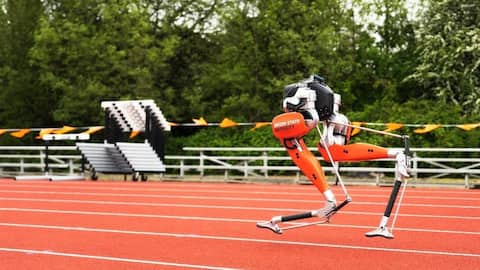Bipedal robot sets 100m world record; it's not that fast
What's the story
The new 100m sprint world record is 24.73 seconds. No, we haven't forgotten Usain Bolt's 9.58 seconds.
This is the Guinness World Record for the fastest 100m by a bipedal robot. The time was achieved by Cassie, a robot developed at the Oregon State University.
Cassie is the first bipedal robot to use machine learning to maintain a running gait on an outdoor course.
Context
Why does this story matter?
Cassie, the OSU robot, ran 100m in record time and bagged the world record. It wasn't that fast.
In fact, if we run a little faster than our average jogging speed, we can easily thrash Cassie's record.
What's special about this is not the speed. Instead, it's the implications that this record attempt will have on the future of AI, machine learning, and robotics.
Finance
Cassie was developed with a $1 million grant
Cassie, the bipedal robot, was developed by OSU's College of Engineering and produced by Agility Robotics. The project was headed by Jonathan Hurst, a robotics professor, and Alan Fern, an AI professor.
The robot was developed with a $1 million grant from the Defense Advanced Research Projects Agency (DARPA).
A neural network trained for about a year in simulation controls Cassie.
Challenge
Starting and stopping in a standing position was a challenge
Cassie was introduced to the world in 2017. In 2021, the robot ran 5km in just over 53 minutes.
Running was the easy bit for Cassie. The hard part was to figure out how to make the robot sprint from a standing position and then return to the same position when it stops.
This parameter was essential for the record.
Record
Cassie ran the course in 24.73 seconds
On May 11, 2022, Cassie 'walked up' to the starting line at OSU's Whyte Track and Field Center. The record the robot attempted to break was not one of momentary top speed.
It was more of a measure of effective average speed across a certain distance.
Cassie ran the course in 24.73 seconds, starting and stopping in a standing position, and bagged the record.
